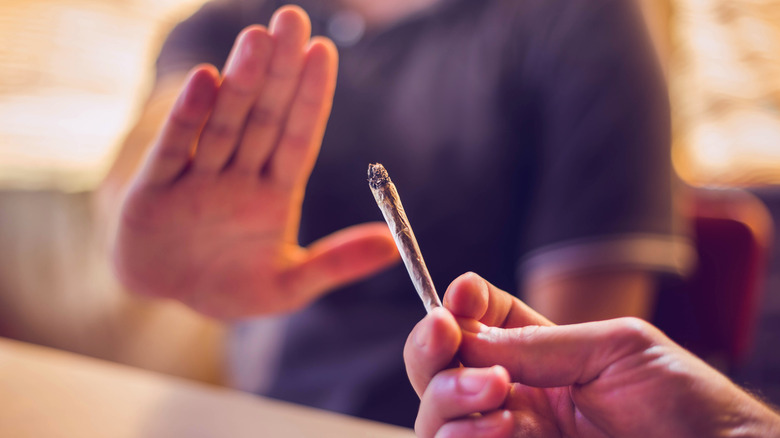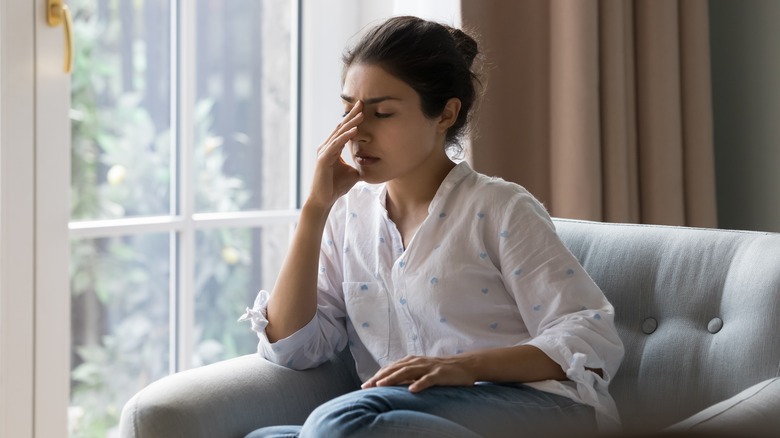What Happens To Your Body When You Try To Quit Marijuana
Marijuana (also commonly called cannabis) is becoming more prevalent for both recreational and medical uses in the U.S. According to Reuters, as of June 2023, recreational marijuana usage in adults is legal in 23 states and counting. It's also legal in the District of Columbia for such purposes, as well as in certain U.S. territories, such as the Northern Mariana Islands and Guam. Such law changes coincide with continuing medical research, along with shifting societal opinions regarding marijuana.
However, as with other legalized herbs, supplements, and other substances, the legality of marijuana does not necessarily mean there aren't potential adverse symptoms to consider. Even if you use marijuana for medical purposes rather than recreational ones, it's important to keep in mind that this is still a powerful substance that can cause symptoms of withdrawal, particularly if you've used it for a long time. Many of these symptoms are the worst between two to six days, but as the American Addiction Centers notes, some people may experience withdrawal symptoms for several weeks.
If you are thinking about quitting marijuana, or have recently stopped using it, consider what happens to your body and the specific effects that you may experience. This can help you know what to expect so you can be better prepared.
You may experience symptoms of withdrawal when you quit marijuana
If you experience temporary changes in your body after stopping usage of marijuana, technically you are experiencing "cannabis withdrawal syndrome," which the American Addiction Centers (and the Diagnostic and Statistical Manual of Mental Disorders) defines as experiencing at least three withdrawal symptoms for a week or longer after quitting.
In fact, It's estimated that 47% of people may experience marijuana withdrawal symptoms after they try to quit, according to a 2022 narrative review published in Addiction. Long-term use, heavy use, and more potent cannabis are all factors that can make withdrawal symptoms more severe. Preexisting mental health conditions, mood, and personality disorders can also increase your risk of withdrawal symptoms.
Moreover, per the review published in Addiction, the withdrawal symptoms may be severe enough that some people who previously quit marijuana use end up starting up again. The authors of the review call this a "relapse to cannabis use." If you want to quit marijuana and are concerned about whether such withdrawal symptoms could cause you to relapse, it can be helpful to know the possible effects on your body ahead of time so you can best prepare. It's also important to keep in mind that the symptoms are usually temporary and more acute in the early stages of withdrawal.
You may experience problems with sleeping after quitting marijuana
One of the first things you may notice after quitting marijuana is that you're having problems sleeping. This can present itself through insomnia, where you're having trouble falling asleep, or even daytime restlessness despite not getting enough sleep the night before. Odd dreams and general sleep disturbances are all also possible. According to the American Addiction Centers, sleep problems are the most reported and bothersome symptom of marijuana withdrawal, and it tends to develop within the first few days. Since it can also last for up to 45 days, sleep problems are a big reason why some people decide to pick up marijuana use again.
If you're getting poor sleep regularly, you may consider talking with a doctor about short-term medications that can help while you go through marijuana withdrawal. Some of these options include zolpidem, a type of prescription medication used specifically for insomnia; diazepam, a type of anti-anxiety medication; and promethazine, which is also used to help treat motion sickness. According to the Mayo Clinic, melatonin supplements, which are available over the counter, may also be a short-term treatment for insomnia, though these may not affect the total amount of time you're asleep.
Why exactly does quitting marijuana affect your sleep? One explanation could be its effects on adenosine, a neurotransmitter in your brain. According to the Sleep Foundation, using marijuana could promote adenosine and treat insomnia in some people. Once you stop, the opposite effects may occur.
Your appetite and body weight may change when you quit using marijuana
Marijuana has anecdotally been associated with an increased appetite for years, and is often referred to as getting the "munchies." As a 2015 article in Nature explains, smoking marijuana activates CB1 receptors in your brain, which can then increase hunger hormone levels. On the flip side, suppressing CB1 receptors has the opposite effect, where you may experience a decreased appetite and subsequent weight loss.
It is also important to note that body weight and weight loss are complex issues that are affected by many factors. For example, while evidence supporting marijuana as a weight loss tool is largely unfounded, there may be some reasons why some people might lose weight while using the substance, such as improved sleep and mood, according to Insider. Still, these positive effects may not necessarily counter marijuana's ability to increase your appetite and possibly cause you to eat more than your body needs in a given time.
Overall, quitting marijuana is more likely to cause decreased appetite and unintentional weight loss. If a doctor suggests losing weight for your health, this may be a welcome effect when deciding to stop using marijuana. However, if you don't necessarily need to lose weight, and your overall lack of appetite is severe, you may consider talking with your doctor about nutritional support. This can help ensure you're getting the macronutrients and micronutrients you need for your body to function correctly, while also stabilizing what might be considered a healthy weight for you.
Your stomach may not be happy after you stop using marijuana
Nausea, vomiting, and abdominal pains are all possible side effects after you quit marijuana. These gastrointestinal effects can also contribute to the aforementioned decreased appetite and unintentional weight loss. After all, if you are nauseous, you likely don't have much of an appetite for food and may unintentionally lose weight from eating less.
It's also important to note that these types of symptoms are also associated with cannabinoid hyperemesis syndrome, or CHS. If you've been using marijuana for a long time and start experiencing nausea, vomiting, and abdominal pain, it's possible you might have CHS. This is often an emergency medical situation that can improve with treatment, according to Crest View Recovery Center. However, if you're experiencing these stomach-related problems after quitting marijuana, it's more likely that these are related to withdrawal.
Like other marijuana withdrawal symptoms, stomach-related problems tend to be temporary and will ease as your body gets used to not being exposed to marijuana any longer. However, there are options for treating nausea, stomach pain, and vomiting. One example is metoclopramide, which is a prescription medication typically used to help treat gastroesophageal reflux disease (GERD). Other tips for controlling nausea and vomiting include drinking clear fluids, eating bland foods such as saltine crackers, and eating smaller meals throughout the day. However, if problems persist, or if you've been vomiting for longer than 24 hours, the Cleveland Clinic recommends seeking medical treatment right away.
You may experience mood changes after quitting marijuana
It's also common to experience changes in your mood when you stop using marijuana. Irritability, increased anger, and aggression are possible, as well as anxiety and depression. The severity of mood changes is highly individual, and if you have pre-existing mental health conditions, you might experience worsening symptoms where marijuana previously helped you feel better. In particular, people with anxiety, mood disorders, or post-traumatic stress disorder (PTSD) may be more at risk for marijuana withdrawal symptoms.
If your doctor thinks medications might help ease some of the mood changes that are attributed to marijuana withdrawal, some of the possible options include diazepam (for irritability and anxiety), antidepressants, or antipsychotics. Therapy may be another option to complement medications. Cognitive behavioral therapy (CBT) is one such approach that works to help people recognize certain behavioral responses and adjust them accordingly. This type of psychotherapy may also be helpful in preventing relapse if you're trying to quit using marijuana completely.
When considering mood disorders, it's also important to acknowledge the fact that many people use marijuana to cope with symptoms of mental health or personality disorders. According to a 2018 review published in Current Addiction Reports, marijuana usage tends to be higher among people who struggle with bipolar and major depressive disorders. Furthermore, heavy use, dependence, and withdrawal symptoms were higher among those with mental health conditions. It's important not to self-treat with marijuana or any substance without first talking with a doctor.
You might sweat more than normal after quitting marijuana
One seemingly unusual symptom you might not associate with quitting marijuana is excessive sweating. While not considered as common as other marijuana withdrawal symptoms, it is still important to notice whether your amount of sweat is healthy or not. Also called hyperhidrosis, excessive sweating is defined as your body's sweat glands producing more sweat than normal, often to the point where you might be uncomfortable or embarrassed. It's even possible to sweat during periods of rest.
If you're finding that you're sweating a lot within the first several days of quitting marijuana, it's possible that your body is getting used to the absence of cannabis. However, you may also consider talking with your doctor if you have other risk factors for hyperhidrosis. According to the Cleveland Clinic, hyperhidrosis may either be "primary" or "secondary." Primary focal hyperhidrosis is usually caused by your genes and often develops by your 20s. Some of the most common causes of secondary hyperhidrosis, on the other hand, include medication side effects, or certain existing health conditions like anxiety, infections, or diabetes. Marijuana withdrawal would be considered a secondary type of hyperhidrosis.
As your body gets used to the absence of marijuana in your system, you can help minimize excess sweating by wearing breathable clothes, making sure you use antiperspirant, and taking extra showers to help cool yourself down. If these don't help, the Cleveland Clinic says that a doctor may recommend medications, such as anticholinergic agents.
You may have flu-like symptoms after you stop using marijuana
Aside from sweating, it's also possible to experience flu-like symptoms as part of marijuana withdrawal. Specifically, you may experience muscle aches, fever, and chills. If such symptoms persist despite getting tested for infections, and you have just stopped using marijuana, chances are that you aren't actually sick with the flu. Also sometimes called "flu-like syndrome," other symptoms may be similar to other marijuana withdrawal symptoms such as nausea, decreased appetite, and headaches. Extreme fatigue is also common in the flu and flu-like syndrome.
Ironically, while you don't actually have the flu, these marijuana withdrawal symptoms feel similar and have a similar timeline as the actual flu virus. According to FHE Health, flu-like symptoms from substance withdrawal most often peak within two to three days, and can last up to one week. However, if you're also experiencing signs of dehydration, an irregular heartbeat, or seizures, these may be signs of a medical emergency that aren't related to quitting marijuana.
If you do have flu-like symptoms after stopping marijuana, not only are the signs and duration similar to the flu, but the treatment is as well. Most often, time and rest are what's needed to help remedy the situation. Over-the-counter pain relievers, such as acetaminophen (Tylenol) or ibuprofen (Advil) can help with muscle aches and fever, but be sure to ask your doctor if these are safe for you before use.
It's possible to experience headaches when you stop marijuana
Headaches are another possible symptom of marijuana withdrawal. It's also important to note that headaches may or may not occur with flu-like symptoms, as discussed above. As with other withdrawal symptoms, headaches may develop within the first few days of stopping marijuana. Also, according to Weedless.org, while most people who experience withdrawal headaches after quitting marijuana may do so for up to two weeks, it's possible that such symptoms may last for several weeks. This is all thanks to the lack of THC in the body, which may have previously attached to receptors in your brain. When your brain doesn't have THC anymore, it may respond with temporary headaches. Such cases are also more likely in younger and more frequent marijuana users.
All of this may not be welcome news, especially if you previously used marijuana as a method of headache treatment. According to a 2018 review published in Headache, research is increasingly showing that cannabis may be helpful in various types of pain management, including chronic migraines and headaches. While most cases of marijuana withdrawal headaches improve after several days, this can still be a debilitating process that can keep you from your everyday activities.
If you're experiencing severe headaches that interfere with work or other important activities, consider talking with a doctor about your options. One such method may involve non-opioid analgesics, such as Tylenol. Headache home remedies recommended by WebMD include the use of cold packs, drinking fluids, and relaxation techniques.
Tremors may also occur when you stop marijuana
Tremors are another possible symptom that may occur when you stop marijuana usage. Classified as a neurological condition, tremors involve shaking or trembling in your body. According to the National Institute of Neurological Disorders and Stroke, tremors are most common in your hands, but they can also commonly develop in your legs, arms, and head. Tremors can technically occur anywhere, even in your vocal cords. While not considered life-threatening, tremors can make everyday movements challenging, especially if they're more severe.
Tremors or general shakiness are also common with detoxing from other types of substances, including alcohol and drugs. According to the Findlay Recovery Center, tremors develop when your brain is no longer exposed to a particular substance and must go through a period of readjustment. Most cases resolve on their own as your brain gets used to your new normal. In more severe instances, your doctor may temporarily prescribe medications to help get your tremors under control. These may include tranquilizers or beta-blocking medications, among others.
Thankfully, tremors associated with marijuana cessation are usually temporary. If your tremors last beyond a few weeks, it may be time to talk with a doctor about treatment options or other possible causes. Other risk factors for tremors include consuming too much caffeine, anxiety, and not getting enough sleep.
When you should seek medical help for quitting marijuana
When your brain and body are used to a substance, such as marijuana, it's only natural that you might experience unusual symptoms during a readjustment period after quitting. For most people, withdrawal symptoms are mild and temporary, with no long-term complications expected. Still, it's important to be aware of all of the possible symptoms so you won't be caught off guard should they happen to you.
There's no single treatment for easing marijuana withdrawal symptoms. As such, it is important to consider symptoms separately and to try the aforementioned treatment options that can help these more specifically. A health care provider may prescribe medications on a short-term basis for severe symptoms, such as anxiety or depression.
While most people should experience relief from marijuana withdrawal symptoms within three weeks, it's possible that some discomforts may last longer. Whether this involves insomnia, headaches, mood changes, or another discomfort, you may consider reaching out to your doctor if your symptoms last longer than a few weeks. Aside from recommending treatments, they may also be able to determine whether your symptoms are definitively related to marijuana withdrawal, or perhaps another medical condition you may be experiencing.










